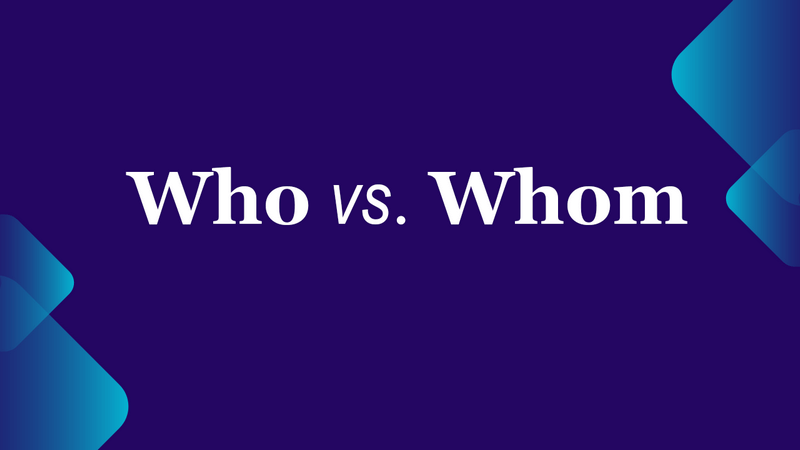You may often come across confusion between the usage of who and whom. These two words are examples of relative pronouns that are commonly used in the English language.
The correct use of who and whom can enhance the clarity and accuracy of your writing, while incorrect use can lead to confusion and miscommunication.
In this article, we will explore the difference between who and whom, when to use them, and how to identify their correct usage in a sentence.
| Who | Whom | |
|---|---|---|
| Usage | Used when referring to the subject or doer of an action. | Used when referring to the object or receiver of an action. |
| Example | Who is going to the party? | To whom did you lend your car? |
When to use who
Who is used when you’re referring to the subject in the sentence. This is the person that is doing the action. We can use it when:
- providing extra information about the subject in the sentence.
- when you are asking about the subject.
An easy way to identify when you need to use who is if you can replace the pronoun with he, she or they, then use who, or if you can answer the question with he, she or they, then you can also use who.
Let’s go through a few examples:
- Ali is my friend who is a teacher.
Here we can replace the pronoun. We can say “Ali is my friend, he is a teacher.”
- Who rang the doorbell?
We can answer this question with “He rang the doorbell, she rang the doorbell or they rang the doorbell” depending on who rang the doorbell.
When to use whom
Whom is used when referring to the object. This is the receiver of the action. We can use whom:
- when providing extra information about the object in the sentence.
- when you are asking about the object.
Again, an easy way to know when you need to use whom is if you can replace the pronoun with him/her or them, or if you can answer the question with him/her or them.
Examples:
- Ali is the man whom I told you about.
If we can restructure the sentence to say “Ali is the man I told you about him“, we can’t say “Ali is the man I told you about he“. It doesn’t make sense.
- To whom did you give the notebook?
The answer to this question would be “I gave the notebook to her” or “I gave the notebook to him” depending on who you gave the notebook to.
Can whom be replaced with who?
Some people still use whom in formal writing or in situations where correct grammar is important. However, in casual speech and informal writing, it is becoming more common to use who. This is because the use of whom can sometimes sound awkward or stilted, especially in everyday conversation.
Here are some examples:
- Whom did you invite to the party? –> Who did you invite to the party?
- Whom are you going to call? –> Who are you going to call?
- For whom is this book intended? –> Who is this book intended for?
While these sentences can still be understood when who is used instead of whom, using whom is grammatically correct and is still preferred in very formal speech or writing.
Note: In set idiomatic phrases, whom is often used because it is part of the established phrase.
- For whom the bell tolls.
- To whom this may concern.
Who vs. whom sentence examples (with an explanation)
Here are some more examples that demonstrate the difference between who and whom. By using the “he/she” or “him/her” test, you can often determine whether to use who or whom in a sentence.
- The team chose the player who had the most experience. (He/she had the most experience, not “him/her” had the most experience)
- I don’t know who came up with the idea, but it’s brilliant. (He/she came up with the idea, not “him/her” came up with the idea)
- The woman who works at the store is very friendly. (She works at the store, not “her” works at the store)
- That’s the guy with whom I went to college. (I went to college with him. Not I went to college with “he”)
- I know whom he hired for the job. (He hired him/her. Not he hired “he/she”)
- For whom did you buy the gift? (You bought the gift for him/her. Not you bought the gift for “he/she”)
To sum up, the usage of who vs. whom can be a tricky subject in the English language. However, by understanding the basic rules and identifying the subject and object in a sentence, we can use these relative pronouns accurately and effectively.
Remember, who is used for the subject of a sentence, while whom is used for the object.
By following the tips and examples in this article, you can improve your grammar skills and communicate more clearly in both written and spoken English. So, go ahead and practice using who and whom in your everyday conversations and writing, and soon it will become second nature to you.

